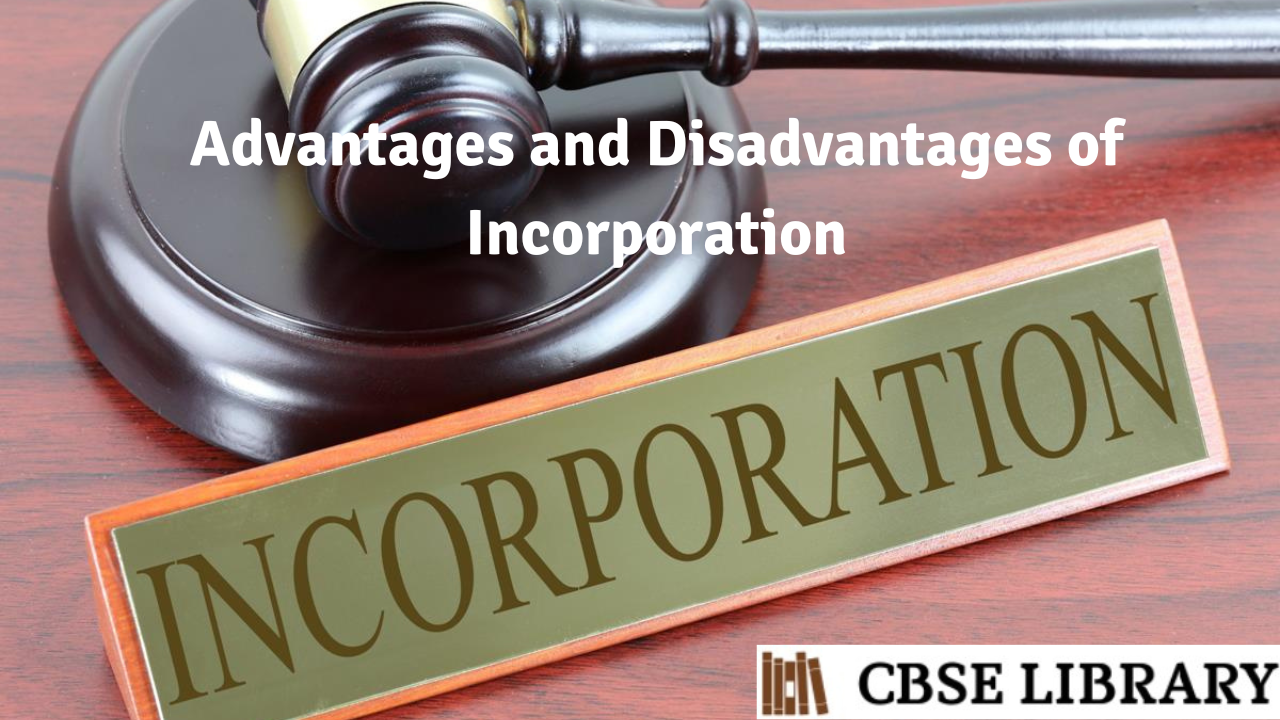Incorporation Advantages and Disadvantages: In business, the term “Incorporation” refers to the process of forming a corporation or a legal business entity. It typically involves registering the individual or group of individuals with the appropriate government body and may also involve paying fees, issuing shares and holding an initial meeting of shareholders. In other words, incorporation is the creation of a new legal entity. The new entity is a separate legal entity from its owners and has many benefits. The most obvious one is limited liability, i.e., shareholders are not liable for debts of the corporation, except to the extent of their investment in the corporation. This limited liability also protects the owners from being held personally responsible for debts incurred by the corporation.
The other obvious advantage is transferable ownership. This means that ownership in a corporation can be transferred by selling shares of stock. Another merit of incorporation is continuous existence: A corporation exists indefinitely, even if its owners die or otherwise leave the business. The death or departure of an owner does not affect the existence of the corporation. The most important benefit of incorporation is that it helps raise capital. In other words, a corporation can raise capital by selling shares of stock to investors. This makes it easier for a corporation to raise large amounts of money than it would be for a sole proprietorship or partnership to do so. In this article, we shall explore the advantages and disadvantages of incorporation.
Students can also find more Advantages and Disadvantages articles on events, persons, sports, technology, and many more.
- Advantages of Incorporation
- Disadvantages of Incorporation
- Comparison Table for Advantages and Disadvantages of Incorporation
- Conclusion on Incorporation – Advantages And Disadvantages
- FAQs on Advantages And Disadvantages of Incorporation
Advantages of Incorporation
Incorporating a business has a number of advantages, such as:
- Limited liability: Incorporating a business creates a separate legal entity, which means that you and your business are separate entities in the eyes of the law. This separation protects your personal assets from being at risk in case your business becomes bankrupt
- Increased credibility: When you incorporate your business, it shows that you are serious about your business and are committed to its long-term success. This can help you attract customers, partners, and investors.
- Flexible ownership structure: An incorporation allows for multiple shareholders, which can give your business the capital it needs to grow. Additionally, an incorporation can make it easier to transfer ownership of your business in the future.
- Tax benefits: There are a number of tax benefits that come with incorporating your business, including the ability to deduct certain expenses and the possibility of paying a lower tax rate on profits.
- Business continuity: Incorporating your business can help ensure its continuity in the event of your death or disability, as well as protect against personal liability in these situations.
Disadvantages of Incorporation
There are a few potential drawbacks to incorporation that business owners should be aware of:
- Strict Rules – One is the increased cost of compliance with state and federal regulations. This can be a significant expense for small businesses, particularly if they are not used to dealing with these sorts of compliance issues.
- Difficulty in making decisions – Another potential drawback is the loss of flexibility that comes with incorporation. For example, businesses may have to comply with certain rules and regulations regarding their corporate structure and governance. This can make it more difficult to change direction or make other decisions that could be beneficial for the business in the long run.
- Higher risk – Finally, incorporation can also create a higher level of risk for business owners. This is because shareholders may be held liable for the debts and liabilities of the corporation. This can be a serious concern for businesses that are already struggling financially.
- Double Taxation – Double taxation occurs when the income that a corporation earns is taxed first at the corporate level and again when it’s distributed to shareholders. This means that owners are paying taxes on their income twice, once when it’s earned by the corporation and then as an individual. Double taxation can provide an incentive for companies to remain privately owned rather than go public in order to avoid this tax burden.
- Difficulty Dissolving – Incorporation is often difficult to dissolve. When a corporation reaches the point in its life span where it no longer makes sense for it to continue, the corporation still needs to file paperwork with the state and other entities. Additionally, if there are debts that need to be paid off, then those creditors will have to be contacted before dissolution can happen. This process can take months or even years, depending on the number of debts and how much time creditors are willing to put into filing lawsuits against the corporation.
While these were some potential drawbacks to incorporation, it is still generally seen as a positive step for many businesses. The key is to weigh the pros and cons carefully before making a decision.

Comparison Table for Advantages and Disadvantages of Incorporation
Following are the advantages and disadvantages of Incorporation:
| Owners and stakeholders have limited liability | Have stricter rules and regulations |
| Entity has increased credibility | Decisions are more difficult to make |
| Ownership structure is flexible | Risks are higher |
| More tax benefits | Double tax |
| Eternal business continuity | Dissolving the corporation is not easy |
Conclusion on Incorporation – Advantages And Disadvantages
Incorporation has a lot of advantages, from limited liability to tax benefits. But it’s not right for every business. There are a few disadvantages to incorporation that you should be aware of before making the decision to incorporate your business. These include increased responsibilities and costs, as well as loss of flexibility in how you can run your business. Weigh the pros and cons carefully before deciding if incorporation is right for you.
FAQs on Advantages And Disadvantages of Incorporation
Question 1.
What is Incorporation?
Answer:
Being incorporated means that a company is recognized as a separate legal entity and can have the rights of an individual. Incorporation also provides limited liability protection to the shareholders and directors.
Question 2.
What are the advantages and disadvantages of Incorporation?
Answer:
There are many advantages and disadvantages of incorporation. Incorporation can provide protection against individual liability and personal debts. This means that the owners of the company and shareholders have limited liability. However, there are disadvantages to incorporating. The first disadvantage is that it costs money to incorporate, which will reduce shareholder profits in the long-run. Second, incorporation can make taxation more complicated because there are different rates depending on whether or not a company has obtained legal status as a corporation.
Question 3.
Why is Incorporation important?
Answer:
The most important benefit of incorporating is that it offers limited liability. If a company doesn’t have limited liability protection, then the people who own the company will be personally liable for any debt. This means that if a company defaults on its loans and the creditors want to sue and collect their money, they can do so by using each individual and seeking personal assets. Another benefit of incorporation includes being able to offer shares to investors in order to raise capital.
Question 4.
What does it mean to be incorporated?
Answer:
Incorporating is the process of filing paperwork with the state in order to separate a business and its assets from the owner. This can be done by setting up an S-corporation or a C-corporation. By incorporating, you’ll avoid all personal liability for your company’s debts and losses. You will also be taxed differently as a corporation rather than as an individual. In order to incorporate, you must identify a board of directors, approve bylaws, and make sure that there are enough shares to go around.
